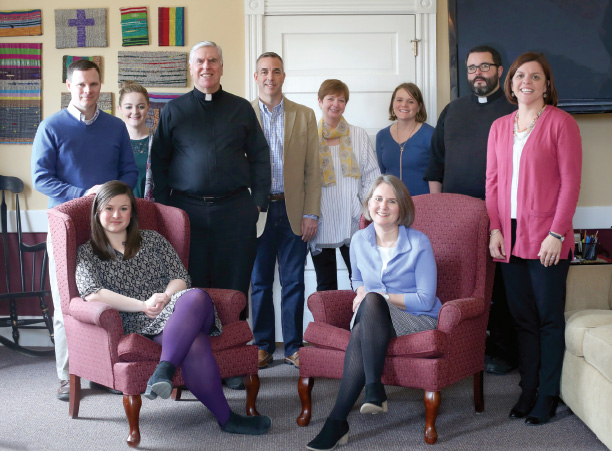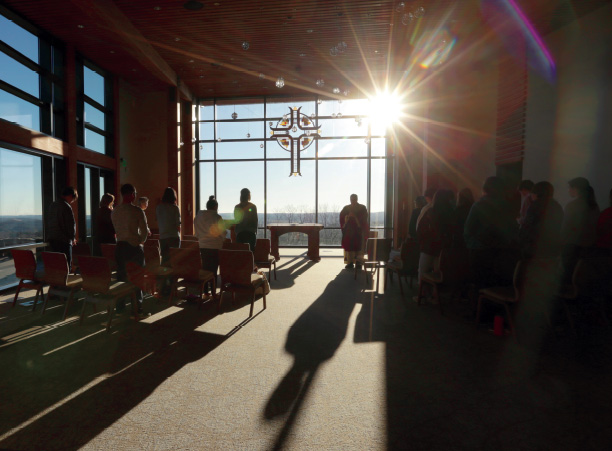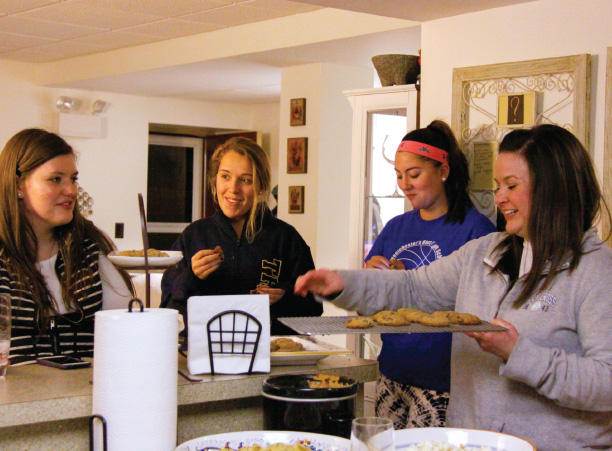
When lacrosse player John Price ’01 passed away suddenly during his junior year in 2000, it was the late Rev. Anthony Kuzniewski, S.J. — in his role as team chaplain — who helped Price’s teammates process their grief.
Together with then-coach Mike McCaffrey, Fr. K encouraged the team to honor Price’s devotion to service in the Worcester community by establishing a partnership with Worcester’s Big Brothers Big Sisters that still exists today.
“Since then, every member of the team and their coaches has been paired with a boy at the Canterbury Street School,” Fr. K wrote in his blog on the Holy Cross website in 2010. “In that time, the blessing associated with remembering John has flowed both to the boys and to their ‘big brothers.’”
As the team’s athletics chaplain, Fr. K not only led Mass and prayers, he also offered guidance for the team off the field as the players confronted their unexpected loss.
“Fr. K was an instrumental part of supporting the men’s lacrosse team, particularly through the tragic passing of our teammate,” remembers Nick Washburn ’02, a player on the team at that time, who wrote to HCM after Fr. K’s death in December 2016.
It’s just one example of how the chaplains at Holy Cross reach out to students wherever they are — on the field, in the classroom or in the residence hall — to accompany them, both literally and spiritually, on their faith journeys.
The chaplains at Holy Cross are trained campus ministers, both Jesuit priests and lay people, who have studied theology and ministry and work to integrate the spiritual and academic experiences on campus.
Collaboration Across Campus
With a full-time staff of nine chaplains and the brand-new Thomas P. Joyce ’59 Contemplative Center as a resource, the Office of the College Chaplains thrives through collaboration across departments and disciplines.
Beyond the retreats, service opportunities and liturgical ministry that have always been a hallmark of the office, the newest offerings bring the work of the chaplains together with academic affairs, student affairs, athletics and residence life — essentially, all aspects of campus life on The Hill.
“Of other liberal arts colleges, we are one of the few with a living faith tradition,” says Marybeth Kearns-Barrett ’84, the director of the Office of the College Chaplains. “I’m grateful that Holy Cross has seen that as worth pursuing and investing in. The size of our staff and the new contemplative center are a great reflection of the commitment to the College’s Jesuit and Catholic identity.”
Kearns-Barrett and her fellow chaplains are dedicated to the Jesuit and Catholic portions of the College’s mission, and work with partners across campus to ensure that this aspect of the mission touches all parts of the undergraduate experience.
Spirituality and Academics
 Rev. Jim Hayes, S.J., '72 at the Spiritual Exercises silent retreat, held in March 2017 at the Joyce Contemplative Center. Photo by Tom Rettig
Rev. Jim Hayes, S.J., '72 at the Spiritual Exercises silent retreat, held in March 2017 at the Joyce Contemplative Center. Photo by Tom RettigThe course topics range from philosophy classes on the environment to classics courses on ancient Rome, but contemplation is important to each of them.
“An important part of Ignatian spirituality is the belief that God is found in all things,” says Fox-Kelly. “When students visit the Joyce Contemplative Center, they are offered the opportunity to slow down and pay attention to what is happening in their lives, what brings them joy and when they experience challenge.”
After the students have this opportunity in class, Kearns-Barrett hopes that they’ll consider attending other chaplains’ office programming.
“To have these students experience the Joyce Contemplative Center so early in their time at Holy Cross, we hope this will shape their understanding of the College’s prioritization of contemplation,” Kearns-Barrett says.
In addition to the Montserrat courses, Fox-Kelly also worked with Aaron Sieder, assistant professor of classics, on his course, "Nature in the Classical World." She hosted Sieder and his students at the Joyce Contemplative Center for several hours, for a meditation geared towards environmental spirituality.
“We did a contemplation of place to help the students get a sense of the connection between spirituality and nature in the contemporary world, compared to the classical world they were studying,” she says. “It is an Ignatian tool of prayer to get a sense of where they are, an awareness of space and the place they are in.”
Spirituality and Extracurriculars
Marty Kelly, associate chaplain and director of service and social justice programs (and Fox-Kelly’s husband), worked with the Donelan Office of Community-Based Learning (CBL) and the Office of Multicultural Education on a social justice retreat, which also took place at the Joyce Contemplative Center, in October 2016.
“We felt that there were lots of students concerned with issues of justice, but they were not really connected to one another,” Kelly says.
In attending student affairs events about justice issues, Kelly started to notice that students he knew were involved in Student Programs for Urban Development (SPUD) or other chaplains’ office programs weren’t in attendance, and vice versa. “So we thought, ‘Why don’t we bring those students together, and build a sense of community around common interests and common values?’ We hoped that they could collaborate more effectively and were also trying to model that collaboration between our offices at the same time.”
Isabelle Jenkins, the associate director of CBL, and Rob Jones, the associate director of multicultural peer education, worked with Kelly on the overnight retreat, which included discussions about the meaning of social justice and their efforts in context with the mission of Holy Cross. Students from peace group Pax Christi, SPUD, Eco-Action, PRIDE and multicultural peer educators (MPEs), as well as CBL student interns, came together for the event.
“One of the goals was to encourage students to take action together, and that is still ongoing,” Kelly says. The retreat participants have formed a new student group, the Social Justice Coalition, to plan future events.
“This cross-fertilization is exciting and shows the interdisciplinary nature of our efforts here,” says Rev. William Campbell, S.J., ’87, vice president for mission. “We’re not fragmenting. Rather we are talking about mind, body and spirit, and integrating these concepts into the academic and residential experience of the students.”
Spirituality and Athletics
That includes the student-athletes, whose jam-packed schedules usually include weekends and school breaks dedicated to games, meets, races and competitions. There often isn’t time to get away and contemplate at a retreat, but this is where the athletics chaplains come in.
Fr. K took the lead in creating an athletics chaplain program, and today, Rev. Mike Rogers, S.J., ’02, Rev. John Gavin, S.J., and Rev. Edward Vodoklys, S.J., ’72 keep the tradition alive.
The chaplains’ office is collaborating with athletics to create a model for the future that would offer chaplain support to all teams, says Kearns-Barrett. She is working with Fr. Rogers to create opportunities for each team to visit the Joyce Contemplative Center for dinner and prayerful reflection.
"I think it's really the wave of the future," she says.
“It’s about being there when a student needs to talk or needs a listening ear that is not a coach. We are going to our students where they are and being there for them when they need to talk about something," says Fr. Rogers.
“This is something that Fr. K said, that our students oftentimes see a division in their lives: I’m this person in the classroom, this person on the court and this person when I am relaxing with my friends,” Fr. Rogers says. “As chaplains, we can show them that with faith, they can integrate all those things. All parts of their lives are good and holy and God can be in that.”
Fr. K’s reminder has also inspired Fr. Rogers to reach out to groups that don’t necessarily have a traditional chaplain, but still need community support. “I am also going to show up at the jazz band concert and the theater productions, for example, because that’s a part of who we are,” he says.
Spirituality and Residence Life
The efforts of the office also extend to residence life here on campus — two chaplains live in first-year residence halls, as an intentional way of connecting with students beyond the walls of their Campion House offices.
“It’s a neat way to come to know students in a different way, in their natural habitat, if you will,” says Karla Keppel, assistant chaplain and director of domestic immersion, who lives in an apartment in the basement of Brooks-Mulledy Hall with her husband. “It creates a really important common ground for me when I’m building relationships with students, especially first-year students who are finding their place on campus. I can talk about how I live in a hall, too, or ask them about their dorm or hallmates.”
Keppel and her husband, Matt — a high school theology teacher with a master’s degree in theology — are excited about how their dorm home offers opportunities to get to know students. Their easygoing spirit is evident: They don’t mind when their front door is used as the goal for hallway hockey games, and they make a point to invite students to their apartment. Keppel will order pizza during finals week, and on the third Tuesday of every month, she hosts “Cookies with Keppels.”
 Chaplain Karla Keppel (far right) welcomes students into her Brooks-Mulledy Hall apartment once a month for cookies and conversation, fondly known as "Cookies with the Keppels."
Chaplain Karla Keppel (far right) welcomes students into her Brooks-Mulledy Hall apartment once a month for cookies and conversation, fondly known as "Cookies with the Keppels."Before the Keppels moved in, the Kelly family lived in the apartment with their three sons. “Our kids miss living here,” Fox-Kelly says. “They called Holy Cross their backyard.”
As a family, they saw living in the residence hall as an opportunity to connect with students who might not normally have signed up for a retreat or visited the chaplains’ office. Oftentimes, these interactions would happen when students would see the boys playing outside and join in. Fox-Kelly says that the Holy Cross students were generous with their time in playing with the kids. In this case, the generosity went both ways.
“A lot of students who come to Holy Cross and hear ‘chaplains’ office' are not sure what that means,” says Kelly. “People are coming from a lot of different contexts, so living in the dorm was a way to break down barriers and misperceptions of what our role as chaplains is. We were able to meet students outside of work, and them meeting the kids was a way to normalize us as people. From there it was encouraging students to think about the programs we offer and getting involved.”
Each full-time chaplain is also assigned to a class, as a class chaplain, to journey with them throughout their four years to be a support and sounding board. They are there as another point of contact and resource — for students, faculty and parents alike — if a student is struggling academically or personally.
But the class chaplain isn’t just called upon in times of trouble. Rev. Jim Hayes, S.J., ’71, the associate chaplain for mission, served as the class chaplain for the class of 2015 and started a men’s spirituality group for the class. “We’d meet as a group, almost weekly,” he says. “We’d tell our stories and discuss different topics, so I was very proud to see that class graduate.”
As the office grows and offers new and expanded programming, the student experience remains central to its work.
“Students today are getting a lot more of what is explicitly Jesuit and Catholic, compared to when I was a student (at Holy Cross) in the early 1980s,” Kearns-Barrett says. “Not only is the chaplains’ office still here, but the opportunities are far more extensive. The number of lay people who are trained and committed to the Jesuit identity of the College has multiplied, and there is something to really celebrate in that.”
Written by Maura Sullivan Hill for the Spring 2017 issue of Holy Cross Magazine
About Holy Cross Magazine
Holy Cross Magazine (HCM) is the quarterly alumni publication of the College of the Holy Cross. The award-winning publication is mailed to alumni and friends of the College and includes intriguing profiles, make-you-think features, alumni news, exclusive photos and more. Visit magazine.holycross.edu/about to contact HCM, submit alumni class notes, milestones, or letters to the editor.